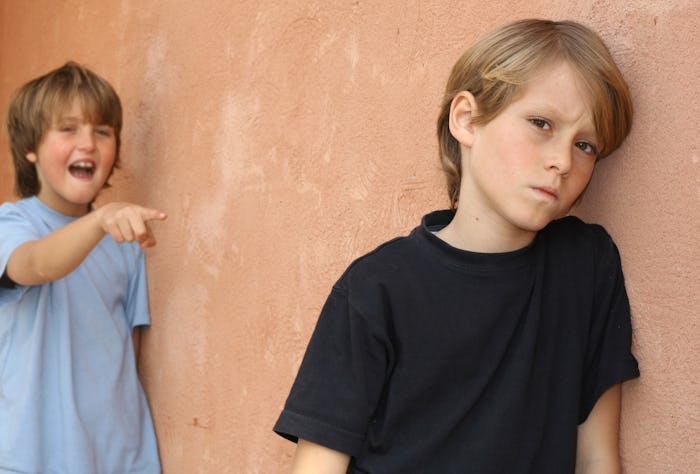If there's one thing about having kids in school that I haven't been looking forward to, it's dealing with bullying. Knowing what to do when your kid is bullied is never easy. I have grappled with what I should be telling my daughter if and/or when she is ever bullied. Should I tell my daughter that if someone hits her, it's OK to hit back? Is that allowed? Should I be promoting kindness and, if I don't, am I dangerously close to giving her permission to hurt others? Am I putting my daughter in more danger if I tell her not to defend herself? Also, I mean, she's so tiny; who could she hurt? Would hitting someone back even help? Hurt? Do anything productive or helpful in an already contentious situation? I feel like it's her right to fight back, but I also feel conflicted. As a feminist who has stood up for what she believes in on social media, I know what it's like to be bullied and I want my children to feel empowered, not victimized. Still, I know that violence doesn't solve anything. And round and round my brain goes, totally not knowing how to handle this complicated and complex issue.
Bullying, in a nutshell, is about intolerance, oppression and exclusion. A child may be bullied because they're overweight, they express themselves differently, they've physically developed early, or they don't fit into traditional and widely accepted gender stereotypes. I feel like it's my job, as a feminist, to fight for equality and fair treatment of all marginalized people, regardless of their orientation, physical attributes or preferences.
I have seen some rather questionable behavior among some my daughter's classmates. What starts out as a play fight can quickly turn into full-on aggression if it's not closely monitored. For example, kids suddenly start claiming parts of the monkey bars as their own, and prevent others from joining in. It can lead the youngest to come crying to their parents, and I'm fully aware that this is just the beginning. So, I am already considering what I will say to my daughter, should she start getting bullied, which will definitely include these nine things:
I'm So Glad You Came To Me So We Can Deal With This Together
This is something that all parents should be telling their kids if and/or when they find out their kid is being bullied, but feminists understand the importance of rallying behind someone that is being marginalized or abused. Letting your kid know that they're not alone in dealing with the situation (or really any situation) is important.
Kids Bully Because They Want To Feel Powerful
Which is why I'm going to tell my daughter that she is powerful, too, even when these kids are trying to make her feel small or ineffectual or anything other than wonderful and amazing. That is something she should never, ever, forget.
This Isn't Your Fault
It's so important for your kid to understand that whoever they are, or whatever they do, they're not the reason for the bullying. How certain people (hell, all people) act is so far out of our control, and when some people act negatively, we must constantly remind ourselves (and our children) that it's not because of us, it's because of them.
Your Bully Is The One With The Problem
Kids who are bullies often act out because of other issues they're dealing with in their life. Maybe they have trouble empathizing with others, or are modeling behavior that they see at home, or perhaps they're going through family trouble of another sort. This doesn't mean we should tolerate the behavior, but compassion and thinking outside of our own experience are traits that feminists believe are important for all kids to develop, if and especially when we want to teach them to respect diversity and fight for equality.
I'm Not Upset
Children of strong women can sometimes feel like they are letting their moms down by being the victim of bullying. They may feel like we assume our kids should be able to take care of themselves or handle anything and everything on their own, which is just, you know, so sad and definitely not accurate. The record needs to be set straight right from the start, so healthy and understandable expectations can be established.
I Know This Hurts
The last thing we ever want to do is brush off the pain that our kid is going through. Bullying is traumatic, and acknowledging it can help to legitimize your child's pain.
Developing Compassion For Your Bully Doesn't Mean You Have To Tolerate It
I know I said before that violence isn't the answer, and I truly believe that. However, assuming that all other options have been attempted (de-escalating, avoiding, minimizing opportunities for interaction), if a kid is going to assault my child, I am not going to be upset if she fights back. Any feminist will tell you there's a time and a place to fight.
You Are Strong And You Will Get Through This
Obviously you don't want to brush-off the present moment, especially when it's one that's filled with pain, but knowing that it gets better at some point can help your kid focus on a light at the end of the tunnel. Feminists want their kids to keep fighting the good fight, even when they have a tough adversary.
You Can Always Feel Safe Coming To Me About Things Like This
Making sure the door is always open, so that the dialogue continues, is super important, especially if you're dealing with the very first instance of bullying. We never want to imply that the scenario is dealt with and over, because it might not be, and the last thing you want is for your kid to feel ashamed that things are continually happening.
